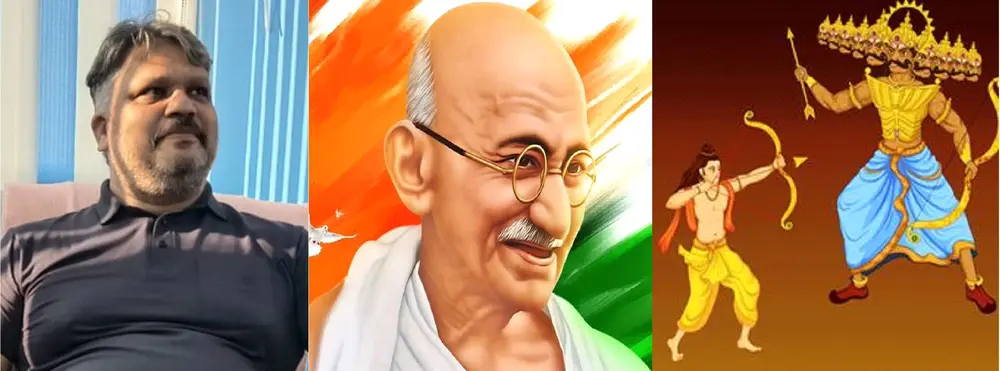
“Goodness, truth, tolerance, and non-violence: the foundation of an ideal life.”
Today, the 2nd of October, is a highly auspicious day. The first reason is that it marks one of the major festivals of our Indian culture, the sacred festival of Dussehra, and the second is the 156th birth anniversary of the Father of the Nation, Mahatma Gandhi. Both occasions honor our great culture and history. Dussehra, also known as Vijayadashami (the day of victory), is a significant festival for Hindus. It is celebrated on the tenth day of the Shukla Paksha (waxing phase of the moon) in the month of Ashwin, following the nine nights of Navratri. On this day, Lord Shri Ram Chandra defeated Ravana, the king of Lanka. This day primarily symbolizes the triumph of good over evil, which is why it is called Vijayadashami.
Today, the 2nd of October, is a highly auspicious day. The first reason is that it marks one of the major festivals of our Indian culture, the sacred festival of Dussehra, and the second is the 156th birth anniversary of the Father of the Nation, Mahatma Gandhi. Both occasions honor our great culture and history. Dussehra, also known as Vijayadashami (the day of victory), is a significant festival for Hindus.
It is celebrated on the tenth day of the Shukla Paksha (waxing phase of the moon) in the month of Ashwin, following the nine nights of Navratri. On this day, Lord Shri Ram Chandra defeated Ravana, the king of Lanka. This day primarily symbolizes the triumph of good over evil, which is why it is called Vijayadashami.
The entire month of Ashwin is filled with festivals and celebrations. The weather becomes pleasant, the heat subsides, and the monsoon ends. On this day, people worship weapons and tools, and new businesses are often initiated. Ramleela is organized in villages and cities alike. On the occasion of Dussehra, fairs are held at various places, and in the evening, effigies of Ravana, Kumbhakarna, and Meghnath, crafted by skilled artisans, are set ablaze.
India is primarily a land of fairs and festivals. Every season in our country is associated with some festival or another. Dussehra is also linked to the change in seasons. Although “global warming” has significantly altered our seasons, if we look back fifty years, this festival was considered a symbol of the onset of the winter season. The word Dussehra means “the festival that conquers ten heads,” as, according to our great ancient text, the Ramayana, Ravana, the king of Lanka, had ten heads. Though Ravana was a learned and valiant warrior, he was also arrogant and deceitful.
When Lord Shri Ram Chandra, along with Mata Sita and Lakshman, was living in exile, Ravana abducted Sita through deception. As a result, a fierce battle ensued between Shri Ram’s army of monkeys and Ravana’s army of demons. Ravana was defeated, and thus, this festival, symbolizing the victory of good over evil, is celebrated every year with great zeal and enthusiasm. All the festivals of our country carry the message of purity, truth, and righteousness. Dussehra is an inspiring festival celebrated as the triumph of truth over falsehood. Maryada Purushottam Shri Ram Chandra is an ideal example of strength, righteousness, truth, and an obedient son.
On this sacred day, the entire nation pays tribute to the Father of the Nation, Mahatma Gandhi, the advocate of truth and non-violence, on his 156th birth anniversary.
"De di hamein aazaadi bina khadg bina dhaal,
Saabarmati ke sant tune kar diya kamaal."
This song by the renowned poet of his time, Pradeep, is a true reflection of Mahatma Gandhi’s thoughts, struggles, and methods. His full name was Mohandas Karamchand Gandhi. Born on October 2, 1869, in Porbandar, a princely state in Gujarat (Kathiawar), Gandhi pursued a law degree abroad but always remained a representative of his country’s culture and values. His thoughts and teachings remain relevant even today. The education system proposed by Gandhi is called “Basic Education.” He believed that children should be educated in their mother tongue to make them skilled and independent. Gandhi was a devotee of non-violence.
He emphasized the importance of khadi to make the nation self-reliant. He was not a proponent of party politics but of people’s politics and the champion of their rights. Democracy was Gandhi’s ideal. Throughout his life, he opposed injustice, exploitation, and untouchability. Gandhi’s greatest weapon against the oppressive rule of the British was Satyagraha. Satyagraha included peaceful methods such as strikes, hunger strikes, non-cooperation, and civil disobedience.
Thus, on this sacred day, just as we need to draw inspiration from the life and noble conduct of Maryada Purushottam Lord Shri Ram Chandra, we should also incorporate Mahatma Gandhi’s selfless thinking, honesty, and other virtues into our daily lives.
-Davinder Kumar





